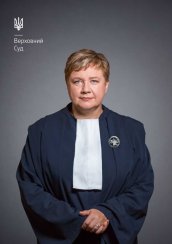Contact center of the Ukrainian Judiciary 044 207-35-46

Technological development affects all areas of life, including the administration of justice. Electronic evidence is increasingly used in criminal proceedings. Part 1 of Article 99 of the Criminal Procedure Code of Ukraine states that electronic evidence belongs to the category of documents. This includes photographic materials, sound and video recordings, and other media (including computer data).
This was stated by Nataliia Marchuk, judge of the Criminal Cassation Court of the Supreme Court, during the launch of the Council of Europe HELP course ‘Cybercrime and Electronic Evidence’. The course aims to deepen the knowledge of practitioners to effectively apply the standards developed under the Council of Europe Convention on Cybercrime in their daily work.
The lecturer drew attention to the case law on the rules for assessing electronic evidence for its admissibility, in particular, the legal positions set out in the resolutions of the Joint Chamber of the CrimCC of the Supreme Court of 29 March 2021 in case No. 554/5090/16-ê and 25 September 2023 in case No. 208/2160/18.
The judge noted that the admissibility of an electronic document as evidence cannot be denied solely on the grounds that it is in electronic form. A duplicate of a document, as well as copies of information, including computer data contained in information (automated) systems, made by an investigator or prosecutor with the involvement of a specialist, are recognised by the court as the original document.
The prosecutor must substantiate the origin of electronic evidence and other procedural issues related to the electronic evidence provided by him, Nataliia Marchuk emphasised. This will allow the court to assess their relevance and admissibility. A common evidence in criminal proceedings today is video surveillance footage. In this case, it is necessary to pay attention to the quality of the video recording so that it can be used to confirm the guilt of the accused person.
The Supreme Court judge emphasised that electronic evidence obtained from open sources should be checked for reliability through the prism of the Berkeley Protocol.
The event was organised by the Council of Europe projects ‘HELP (Human Rights Education for Legal Professionals) for Ukraine, including in Time of War’ and ‘CyberUA: Strengthening capacities on electronic evidence of war crimes and gross human rights violations in Ukraine’ together with the National School of Judges of Ukraine and the Training Centre for Prosecutors of Ukraine.